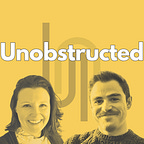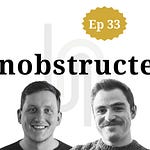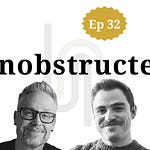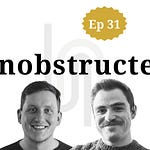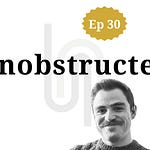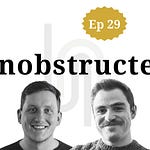Can we cool it with the rush to add more just because we can?
We do this thing where we feel the need to pretend we’re keeping up—even on normal days, where things go somewhat according to plan. Why do we do that, anyway? And wasn’t AI supposed to simplify day-to-day life instead of jamming more into it?
You and I both know things never play out like we thought they would. So of course we’re not fully keeping pace like we feel we should, either.
Rachael thinks AI agents will alleviate this burden from people. She’s become pretty good at building them herself. “I think you give people too much credit—you’re currently a super user of building AI agents” I’d told her. Most people don’t know how to do this yet. They’re stuck with the added pressure it’s creating, though.
So when Rachael said “I was having a shitty day yesterday,” I loved hearing about how she handled it.
The Unobstructed Podcast: Episode 26
In this episode of The Unobstructed Podcast, Rachael and I chit chat about the cultural imbalance of personal and professional lives. I especially enjoyed talking about the performative productivity trend that makes people hesitant to take a sick day.
Thinking out loud, Rachael admitted that, sometimes, having an off day means taking the day off. “I’d just be distracted… thinking about other stuff. Then I’m stuck fixing mistakes I wouldn’t normally make.”
She paused.
“So I went out in my garden, started pulling weeds… spent an hour and a half doing that.”
That’s just part of being human. It’s part of a work day, a work week, and a life. At the same time, it’s taboo to take the day off and call it a mental health day. A real, normal day is the version that has messy parts: doctor’s appointments, kids’ dentist appointments, a vet visit, hosting the plumber/contractor/electrician/realtor… But we still try like hell to convince our boss, coworker, frenemy from accounting, and the whole internet that we’re completely impervious to normalcy.
I think we’ve forgotten what being human can actually look like… ya know, if we weren’t so focused on morphing into machines.
It’s the piles of invisible tasks that suffocate people. I had a glimmer of hope with AI on the rise. Because of the way AI is being positioned right now, as an efficiency tool, it should give us more time back. At least in theory. I’ve hoped it would mean more room to be human—to be creative, to connect with people, to go outside, to exist without justification—rather than frantically juggling a million things and swatting away Slack messages, emails, and at-mentions.
Rachael and I agreed this isn’t the case, but disagreed on why.
Yes, AI is moving the goalposts. The ability to paint with a broader brush, so to speak, has become an expectation to cover more surface area. And the problem is that we keep expanding the size of the canvas. Instead, we could be filling the one we have in less time and then enjoying a bit of extra freedom.
Take a mental health day. Take time off. Take a few minutes to ask someone what they’re excited about instead of interviewing them about their next deadline.
Rachael and I explore more of this in the episode above. You can also listen on Spotify, Apple Podcasts, and Amazon Music.
onward.
P.S. If you’re new to my work, I think you’d also enjoy my blog. That’s where you’ll find everything I publish, including my daily email series.


